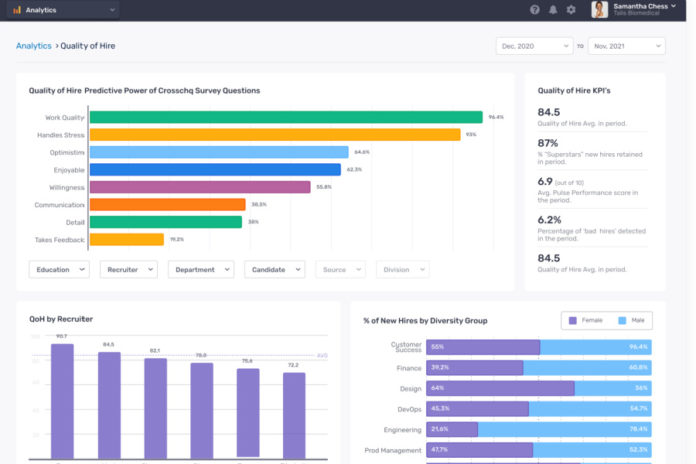
Quality of Hire (QoH, to some) has historically been one of the most elusive business concepts for talent teams to standardize and measure.
So, Crosschq built a platform that gathers and analyzes data points and uses machine learning and artificial intelligence to measure and predict quality of hire. The goal is to help companies take advantage of on-demand insights that are based on hiring outcomes.
.@CrosschqHQ's Q Report identifies five insights that, Crosschq believes, will help employers establish an “outcome-based approach to recruiting analytics.” #HR #HRTech Share on X“Organizational stakeholders are asking for more ‘on-demand’ data insights, pushing people teams to find scalable solutions to keep up with growing demand.” said Crosschq IO Psychologies Amber West.
The Insights
In the resulting Crosschq Q Report, the company identifies five insights revealed by its research. These, Crosschq believes, will help employers establish “a modern outcome-based approach to recruiting analytics.”
For one, many organizations believe that internal referrals are one of the highest performing sources of candidates. Despite that, Crosschq observed that the quality of hire for internal referrals was 26% below the mean. As a result, the company recommends that businesses measure all candidate sources with outcome data.
The study also found that the average quality of hire was only rated 73. Crosschq believes a baseline should be implemented for quality of hire, so that executives can learn what needs to improve in order to raise that level.
In addition, the study revealed that certain types of pre-hire assessments have an inverse correlation to quality of hire, and were not predictive of candidates’ actual success. With one cognitive assessment that has been in use for decades, researchers found that 92% of candidates that scored in the top tenth of the assessment had a QoH in the lowest tenth.
Most interviewers were not skilled or experienced, the research showed. In fact, Crosschq observed that 76% of interviewers only conducted one interview per year, while 87% conducted less than three. The company said this has led to only a 9% correlation rate of interview scores to quality of hire. So, Crosschq recommends that developing and training interviewers should be a priority if a company is to achieve its talent acquisition goals.
Finally, the report showed that companies could (and do) lose some of their top performers through reductions in force / layoffs. The data revealed organizations that fail to leverage performance data often terminate employees with a quality of hire score at least 15% greater than those retained.
Image: Crosschq













